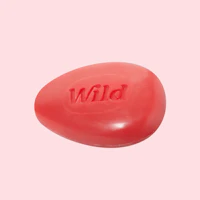- Sustainability
2021 Sustainable Swaps: Part 1
💇♀️ Emma Barber
Happy 2021 Wild things and welcome to the start of another new year! If you’re like us, you may have given up on the idea of a dry January a long, long time ago. Instead, we decided that sustainable swaps would be a good substitute. If you want to get on board with the goal of having a more sustainable 2021, well, you’re in the right place! We’ve got a list of helpful (and realistic) ideas with advice on how to get them done!
If you set yourself a vague, unquantifiable and unattainable goal like ‘I SHALL BE PLASTIC FREE AND CAUSE NO WASTE AT ALL STARTING NOW!’ then you might be setting yourself up for a frustrating and demoralising start to the year. We had enough of those emotions in 2020! We stand with the imperfect eco-warrior - it’s the classic situation of not letting the pressure of being PERFECT stop you from doing what you can.
There are 3 main areas that are good starting places...Cooking, Cleaning, and Clothing!
We’ve split our tips and suggestions for sustainability in these areas into 3 mini blogs. We love food so that’s where we’ve started but make sure to check back in soon for part 2!
Sustainable cooking 101
"Eat less meat" = Go vegan 1 or 2 days per week
The kitchen is always a good place to start with most things (mainly because there are snacks) and sustainability is no exception! Try going vegan or meat-free 2 days a week. There are loads of amazing vegan recipes available online - pick any one that takes your fancy and dive in! We’ve tried and tested some Wagamama recipes and can confirm they’re top-notch. You’ll soon get to know which meat alternatives or substitutes you prefer. Anyone else with a favourite kind of tofu? There is no doubt that choosing the plant-based options might be a bit of a challenge if you haven’t been doing so already, but don’t let the transition put you off (same goes for natural deodorants!)
"Be completely waste free in the kitchen" = I will eliminate as much single-use plastic as possible, find and master some veggie scrap recipes, and eat local and seasonal produce wherever I can
It’s all about small changes making a big difference. Choose loose fruit and veg instead of plastic wrapped ones at the shops. It’s worth buying some produce bags for this. Another great way of eliminating single use plastic is by investing in the refill shopping model. Grab any jars or produce bags you have, look up your nearest refill shop, and get filling! This is great for grains, rice, pasta, herbs/spices, even snacks (yes we love snacks!)
Leftover vegetable scraps can most often be used for making your own stock for soups, sauces and gravies, but you can also reduce the quantity of scrap you produce. Ok, yes you have to peel an onion, an orange, and bananas, but potatoes, apples, kiwis, you don’t! Just give it a good wash. Bonus fact: orange peel can help make a great surface cleaner if soaked in 1 part white vinegar and 1 part water for a few days and put in a reused spray bottle.
Maybe there’s a local fruit and veg shop or subscription service nearby you can use instead of the supermarket for your veggies. This will be an easy way to eat seasonal and local produce. If not, it’s time for a bit of research into what is best to eat when and then keep this in mind when you go to the shops.
There are countless sustainable swaps you can make in the kitchen that we haven’t mentioned yet, including using old shirts or towels instead of disposable kitchen towels, using dish soap bars rather than liquid soap from a plastic bottle (although some refill shops have refill stations for these), and ensuring that all bin bags are compostable.
Sustainability in the kitchen isn’t as hard work as you may think - and anyway, even if you do break a sweat, we’ve got you covered! After all, Wild is one of the best sustainable swaps to make when starting your sustainability journey ;) Let us know if you have any more sustainable swap ideas for 2021 by sharing this article and tagging us with your ideas!


















